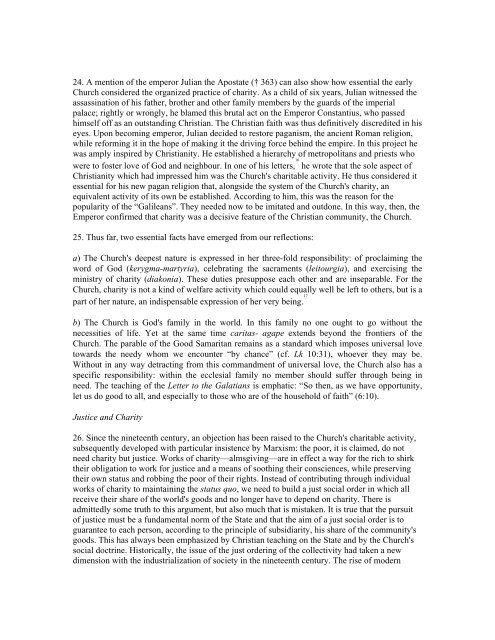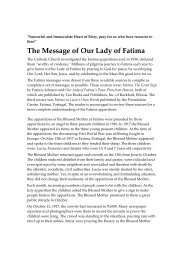God Is Love - Beeldbibliotheek
God Is Love - Beeldbibliotheek
God Is Love - Beeldbibliotheek
- No tags were found...
You also want an ePaper? Increase the reach of your titles
YUMPU automatically turns print PDFs into web optimized ePapers that Google loves.
24. A mention of the emperor Julian the Apostate († 363) can also show how essential the earlyChurch considered the organized practice of charity. As a child of six years, Julian witnessed theassassination of his father, brother and other family members by the guards of the imperialpalace; rightly or wrongly, he blamed this brutal act on the Emperor Constantius, who passedhimself off as an outstanding Christian. The Christian faith was thus definitively discredited in hiseyes. Upon becoming emperor, Julian decided to restore paganism, the ancient Roman religion,while reforming it in the hope of making it the driving force behind the empire. In this project hewas amply inspired by Christianity. He established a hierarchy of metropolitans and priests whowere to foster love of <strong>God</strong> and neighbour. In one of his letters, 16 he wrote that the sole aspect ofChristianity which had impressed him was the Church's charitable activity. He thus considered itessential for his new pagan religion that, alongside the system of the Church's charity, anequivalent activity of its own be established. According to him, this was the reason for thepopularity of the “Galileans”. They needed now to be imitated and outdone. In this way, then, theEmperor confirmed that charity was a decisive feature of the Christian community, the Church.25. Thus far, two essential facts have emerged from our reflections:a) The Church's deepest nature is expressed in her three-fold responsibility: of proclaiming theword of <strong>God</strong> (kerygma-martyria), celebrating the sacraments (leitourgia), and exercising theministry of charity (diakonia). These duties presuppose each other and are inseparable. For theChurch, charity is not a kind of welfare activity which could equally well be left to others, but is apart of her nature, an indispensable expression of her very being. 17b) The Church is <strong>God</strong>'s family in the world. In this family no one ought to go without thenecessities of life. Yet at the same time caritas- agape extends beyond the frontiers of theChurch. The parable of the Good Samaritan remains as a standard which imposes universal lovetowards the needy whom we encounter “by chance” (cf. Lk 10:31), whoever they may be.Without in any way detracting from this commandment of universal love, the Church also has aspecific responsibility: within the ecclesial family no member should suffer through being inneed. The teaching of the Letter to the Galatians is emphatic: “So then, as we have opportunity,let us do good to all, and especially to those who are of the household of faith” (6:10).Justice and Charity26. Since the nineteenth century, an objection has been raised to the Church's charitable activity,subsequently developed with particular insistence by Marxism: the poor, it is claimed, do notneed charity but justice. Works of charity—almsgiving—are in effect a way for the rich to shirktheir obligation to work for justice and a means of soothing their consciences, while preservingtheir own status and robbing the poor of their rights. Instead of contributing through individualworks of charity to maintaining the status quo, we need to build a just social order in which allreceive their share of the world's goods and no longer have to depend on charity. There isadmittedly some truth to this argument, but also much that is mistaken. It is true that the pursuitof justice must be a fundamental norm of the State and that the aim of a just social order is toguarantee to each person, according to the principle of subsidiarity, his share of the community'sgoods. This has always been emphasized by Christian teaching on the State and by the Church'ssocial doctrine. Historically, the issue of the just ordering of the collectivity had taken a newdimension with the industrialization of society in the nineteenth century. The rise of modern












